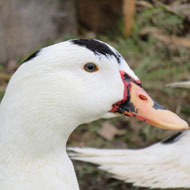Welfare issues ‘at all stages’ of foie gras production

Foie gras is made from the liver of ducks or geese that are specially fattened.
Welfare problems exist at all levels of foie gras production, according to a recent review of duck welfare in France.
The review was carried out to highlight welfare issues in the final stage of production, where ducks are force-fed twice a day with increasingly energy-rich food for around 12-15 days, beginning when they are around 12 weeks old.
However, researchers from the University of Cambridge also identified welfare problems in the first two stages, including poor housing conditions, lack of access to open water for bathing, injuries received during handling and a fear of humans. The review also found the physical condition of the birds deteriorated as they progressed through the three stages of production.
The full findings have been published in UFAW’s scientific journal Animal Welfare.
Foie gras is made from the liver of ducks or geese that are specially fattened. According to EU regulations, the minimum liver weight must be 300g net in ducks and 400g net in geese. UFAW says these weights cannot be achieved without force feeding, but if the weights were reduced it may be possible to produce a fatty liver without force feeding.
Dr Irene Rochlitz from the University of Cambridge, said: “Should foie gras production without force feeding become possible, duck livers should not reach a weight at which there are pathological effects. In order to prevent the accumulation of toxic substances and other adverse effects on welfare due to liver malfunction, maximum liver weights should be specified and based on scientific studies.”
In order to prevent poor welfare due to inadequate housing and management, she added, “limits should be established for the occurrence of welfare indicators such as wing fractures, body lesions, gait abnormalities and contact dermatitis with the birds being checked prior to and/or after slaughter.”
Force feeding is banned in many European and other countries, including the UK, but many of the countries where production is banned continue to import foie gras. There have been a number of recent public calls to ban the practice.



 The Veterinary Medicines Directorate (VMD) is inviting applications from veterinary students to attend a one-week extramural studies (EMS) placement in July 2026.
The Veterinary Medicines Directorate (VMD) is inviting applications from veterinary students to attend a one-week extramural studies (EMS) placement in July 2026.